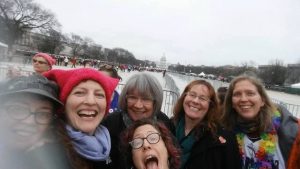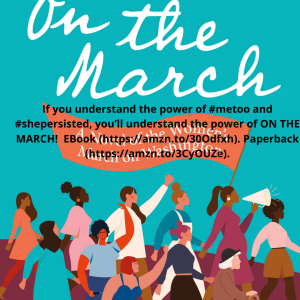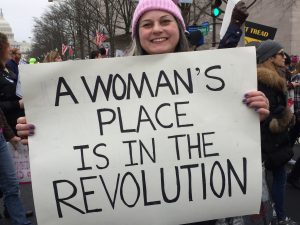THE ROAR HEARD ‘ROUND THE WORLD
-“And then the most astonishing thing happened: The crowd began to roar. The roaring came in a rolling wave, gathering at the far edges of the crowd and then sweeping to the front. It was a tsunami gathering force deep in the ocean of history and then plunging across the world, its beaches, its cities, its farmlands, its mountains, sweeping the entire globe. It felt like church. Like something sacred, transcendent, holy. Decades of silence had been given a voice.” – from ON THE MARCH: A NOVEL OF THE WOMEN’S MARCH ON WASHINGTON by Trudy Krisher
I could never have written those words – or understood their power – until after I had participated in the 2017 Women’s March on Washington. It was an event that deepened my understanding, expanded my creativity, and changed my life.
Women are said to be shy about revealing their age: Not Me! I was proud to have hauled my 70-year-old self onto a bus outside a Wal-Mart in Dayton, Ohio on January 20, 2017 for the 17-hour round trip to Washington, D.C. I was proudly wearing a sturdy pair of sneakers (my knees!) and silently wearing a pair of Depends (my bladder!), thankful for the balmy winter weather that didn’t require a heavy coat (my shoulders!).
Throughout the experience, I heard hundreds of women cheer, shout, and exclaim: “I’ve Never Done Anything Like This Before!” #MeToo!

But I almost didn’t go.
I’d never walked a picket line, stood on a corner waving a sign, or protested on behalf of anything before! That doesn’t mean I didn’t share deep sympathies with those who did. But I was a writer, one of those creatives whose noisemakers were the clickety-clacks and tappity-taps on the keyboard of a computer. The writer in me had always been an observer, seldom a participant. It was in my nature to notice, to perceive, to witness. After all, those observations gave me the novels I had published. Social justice themes were peeking out from under all their covers – I had just never held up a banner on a street corner before.
As a result, I was an unlikely participant in the Women’s March on Washington.
But then my minister-friend, the late Reverend Gregory Martin, encouraged the women of his congregation to march. He held a prayer meeting for us in the days after the election, a healing spiritual exercise in acknowledging our disappointment. I had come to know Reverend Greg as we worked on a team to create worship services, so he knew that I had been an active leader in the local campaign to elect Hillary Clinton. He knew how important it was to me to elevate a qualified and proven woman candidate into the Presidency for the very first time. He knew I was heartsick: at 70, I would likely die before I’d see a woman elected President of the United States.

So, like thousands of other women who were also heartsick, I decided to march.
Like those other heartsick women, the march transformed me. After January 21, 2017, other women ran for office, launched non-profits, and raised their voices like never before. I decided to write a new novel. After all, my motto (and likely yours) is #shepersisted.
ON THE MARCH: A NOVEL OF THE WOMEN’S MARCH ON WASHINGTON became a work of historical fiction. In it, the lives of three women collide when they travel by bus together in 2017 to the National Women’s March on Washington.

Here are the characters: Henrietta Oldham is an elderly woman who runs a failing antique store. Birdie Jackson is a shy African-American teenager who is marching at the insistence of her feminist aunt. Emily Messer is a recent college graduate who needs more in her life than her job as a barista and the love of her dog.
Although Henrietta, Birdie, and Emily appear to have little in common as they begin their ride from Kansas to Washington, D.C., they find common bonds in shared experiences of sexual harassment, pay inequity, self-sabotage, even bra-stuffing. As the women begin to know and trust each other, they each start to discover their voice and cultivate the courage to share their secrets.
Echoes of my own experience “on the march” are woven through the book.
Like Birdie, Henrietta, and Emily, we acknowledged our fears that there might be violence or that we might be arrested. Like Birdie, Henrietta, and Emily, we crowded the trains, bumping elbows with tuxedoed Inauguration-goers from the night before pressed shoulder-to-shoulder with thousands of marchers in pink pussy hats. Like Birdie, Henrietta, and Emily, we carried signs: FREE MELANIA; IF YOU’RE NOT OUTRAGED, YOU’RE NOT PAYING ATTENTION; THERE WILL BE HELL TOUPEE.


Like Birdie, Henrietta, and Emily, we met women we might never have met before: fictional Babs Mildenhaus who was meeting a group of women soccer players from Afghanistan and who passed out buttons saying “Equality is a Team Sport”; fictional Amanda Raymond, a prosthetist who created artificial limbs for wounded vets and then had to fend off their sexual advances; fictional Belinda Gaspard, a high school English Teacher of the Year who had to give up her job to a man who didn’t know the difference between “your” and “you’re,” but who could coach the high school basketball team.
Like Birdie, Henrietta, and Emily, we learned about advocacy groups we’d never heard of before: Women in Islam, National Domestic Workers Alliance, State Administrators of Vocational Rehabilitation, National Resources Defense Council, The Family Caregiver Alliance. Women swarmed the streets and avenues of Washington, D.C., marching for a fifteen dollar minimum wage, for health care initiatives for sex workers, and for the ethical treatment of animals.
Like Birdie, Henrietta, and Emily, we encountered life lessons that we could take into our hearts and into our communities when we went back home. “Asking doesn’t work”; “Tears are the liquid form of anger”; There are three stages in a woman’s life: “Pampers, Kotex, and Depends.”
Like Birdie, Henrietta, and Emily, we found ourselves in the presence of feminist leaders: Gloria Steinem in her red fringed scarf. Gwen Carr in her leopard print belt and “I Can’t Breathe” sweatshirt; above all, Ashley Judd, decked in suffragette white and pearls, riveting the crowd as she launched into her dramatic reading of the “Nasty Woman” poem.

And after that, the roar: “The roaring came in a rolling wave, gathering at the far edges of the crowd and then sweeping to the front. It was a tsunami gathering force deep in the ocean of history and then plunging across the world, its beaches, its cities, its farmlands, its mountains, sweeping the entire globe. It felt like church. Like something sacred, transcendent, holy. Decades of silence had been given a voice.”
And I had been, too.
Trudy Krisher is an award-winning author of eight books. You can learn more about her at www.trudykrisher.com; at Facebook (trudykrisherauthor) and on Instagram (trudykrisherauthor).
